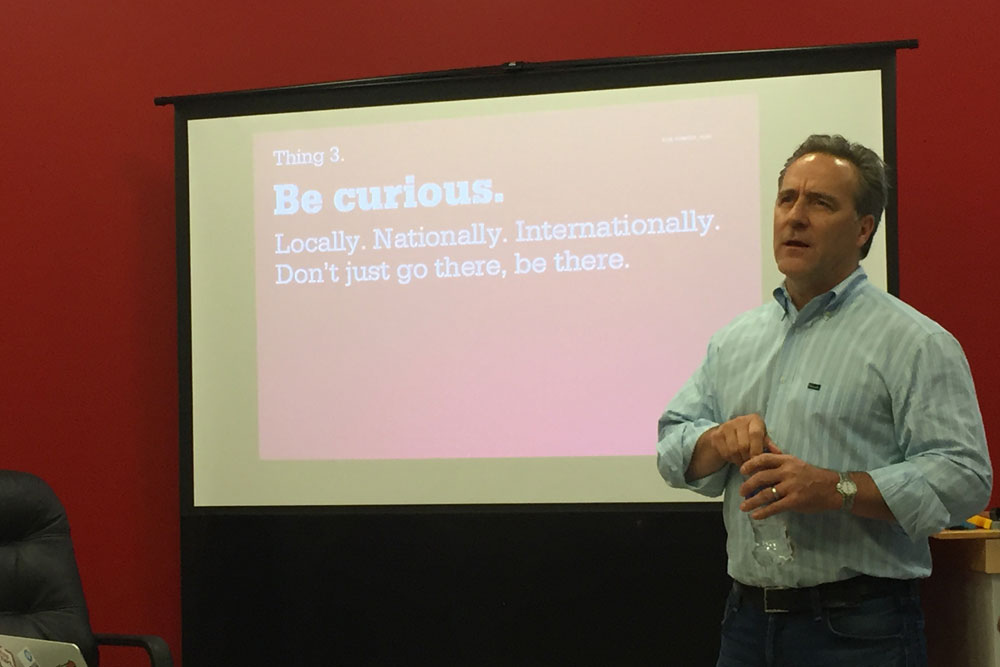We spend a lot of time using words that contain “entrepreneur.” This word has become the focus of business, startup culture and academia. But, is there a common understanding of what it really means?
“By dictionary definition, it often refers to one who takes risks in starting a business. But it is more dimensional and more complex than that,” says Robert Abbott, Denison’s Entrepreneur-in-Residence at the Red Frame Lab.
“To me, the term embodies a set of cross-functional life and professional skills that describe someone who is innovative, resourceful, and driven to create change and value. Entrepreneurship is a mindset, defined by what you DO and how you THINK, much more than who you are or the title you have.”
So, are entrepreneurs born or are they made?
According to Abbott, while entrepreneurs do share some core personality traits, they are the result of nurture more than nature.
“Entrepreneurship must be practiced to be learned. Just as you can’t learn to swim at the library, you can’t learn what entrepreneurship is about without getting your hands dirty.”
Abbott has curated a set of 10 primary attributes that comprise the entrepreneurial mindset. “While each is a discrete attribute, they are often amplified by the others, ” he says.
Ten primary attributes of an entrepreneur are listed below.
- Curiosity: Perhaps, the most important attribute of the entrepreneurial mindset is curiosity, since it drives the very essence of change. Entrepreneurs are constantly seeking, asking, learning and listening. They investigate how the world works and where things tie together. They learn from achievers and examine what made them great.
- Tenacity: A close second is tenacity, the mindset of the person who never gives up, never accepts “no” for an answer, and is tireless in exploring new routes to accomplish their goals when other paths have failed.
- Resilience: If tenacity is about pushing forward every and not accepting “no,” resiliency is about taking punches every day and not falling down. The entrepreneurial mindset is comfortable with learning how to succeed through failure.
- Adaptability: The entrepreneurial mindset tends to be an early adopter and is quick to respond to variables that affect their idea, their business, and their point of view. They understand that change is a certainty, and are not afraid to adapt to unforeseen circumstances. In startup speak, that is referred to as the ability to “pivot.” With customer and competitive insights, the best entrepreneurs fine-tune their product and their business model until they find this groove.
- Connectedness: Entrepreneurs always work to create and expand their networks with customers, partners, fellow entrepreneurs, business leaders, and domain experts, among others. They seek out and connect to individuals who will help form the collaborative bonds needed to grow their idea. Beyond business motivations, they make emotional connections. They make genuine relationships and friendships.
- Inspirational: Successful entrepreneurs have the ability to convince others to believe in possibilities. They motivate and inspire others to move mountains when, by all normal standards, they shouldn’t believe they can. They recognize and nurture talents and qualities in others. This is important because they will need the support of many in order to build their vision and reach their goal.
- Disciplined: The entrepreneurial mindset is brilliant at getting things done. This takes commitment, hard work, and dedication. They get up early, work late, and never give up until they get what they want.
- Risk-tolerant: Risk is a matter of perspective, it’s not an absolute concept. By definition, “entrepreneurs” are people who are willing to take risks to start a business on a leap of faith. They are prepared to take calculated risks and step outside their comfort zone to get what they want. They don’t wait on the sidelines forever doing “side projects” until the day when they’re ready to start a company. If they aren’t willing to take a shot by going full time on their startup, it tells investors they aren’t confident enough in the idea or in themselves.
- Competitive: The best entrepreneurs hate losing. Whether in personal life or business they play to win. Sharing the market is not enough — they want to win every deal, hire every great employee and sign up every partner. They carefully study their competition, try their products, and talk to their customers to identify opportunities to deliver a better product.
- Decisive: Entrepreneurs are faced with a deluge of daily decisions — much of them minutiae. They are good at making decisions, tuning into their gut feeling and weighing consequences in a heartbeat. The more decisions they make, the better they become at decision making.

